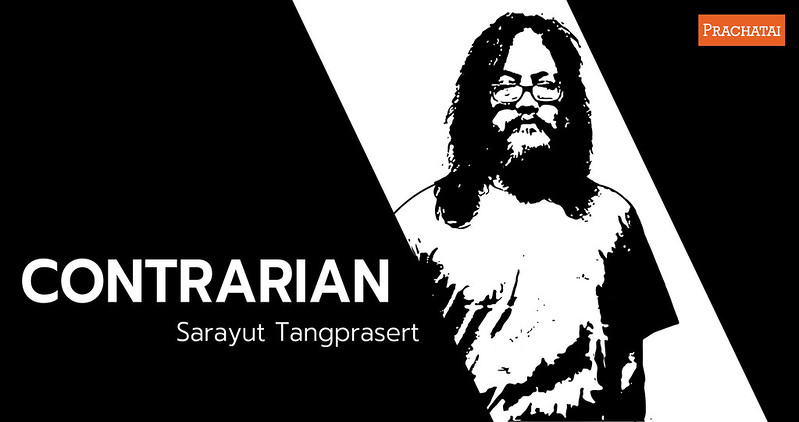On 29 January 2018, the Ratchaburi Provincial Court acquitted Prachatai journalist Taweesak Kerdpoka and the other four activists from the New Democracy Movement. They were accused of distributing stickers to persuade people to reject the junta’s constitution in the 2016 referendum. The only evidence was Vote No stickers found in the car. The Prachatai journalist was arrested and faced the same charge under the Referendum Act merely for sharing the same car as the activists. The Court found the defendants not guilty, reasoning that there was insufficient evidence that the defendants had distributed the stickers.
After the verdict, many people congratulated Prachatai and said that the fact that the court dismissed the case is a victory of the pro-democracy movement. Some even said the case should be used as a standard for other cases related to the anti-charter campaign. I however disagree for the following reasons.
1. The verdict implies that disseminating anti-charter messages is illegal.
It is good that the Court dismissed the case, so the four did not have to serve time in jail nor have a criminal record. But the reason for the dismissal was “insufficient evidence.” The court did not judge if campaigning against the junta’s charter is legal.
The verdict of the Court of First Instance is very problematic. For example, the court found the defendants not guilty because the prosecution could not prove that the defendants had distributed the Vote No stickers. The verdict did not touch upon the content of the stickers at all. The judges took it for granted from the police and the public prosecutor that Vote No stickers are illegal and only examined the question of the distribution of the stickers. This implies that to disseminate a message that disapproves of the junta’s charter, such as by distributing Vote No stickers, is illegal.
A few other cases have been tried in the courts. For example, two activists were charged for distributing Vote No stickers at Phu Khiao District, Chaiyaphum Province. The two activists have stressed their right to freedom of expression as a ground for fighting for their innocence. The verdict of Ratchaburi case is definitely not beneficial to the defendants in the Chaiyaphum case.
2. The court did not differentiate the Prachatai journalist from the activists.
The court did not mention at all the fact that the journalist merely shared the same car as the activists purely for the purpose of reporting about the campaign. This means the court did not differentiate journalists from activists. This puts at risk the status of journalists reporting on anti-junta campaigns in Thailand.
We have already seen another case where journalists face charges along with anti-junta activists. Among 39 individuals facing charges under the Public Assembly Act for allegedly participating in an anti-junta rally on Saturday are at least three journalists who were reporting the incident. The Ratchaburi verdict is dangerous to press freedom in Thailand.
3. A climate of fear was in place and helped the junta’s charter win the referendum by a landslide.
The arrest of five on a very severe charge with a maximum jail term of up to 10 years had already created a climate of fear among opponents of the NCPO and the general public. This silenced criticism of the junta’s charter and the referendum, while at the same time, the junta was campaigning heavily in favour of its charter. The result was a landslide approval in the referendum on 7 August 2016.
Many more villagers and activists also face charges under the Referendum Act. At least 76 people from Udon Thani, Nong Bua Lamphu, Sakon Nakhon, Surin and Nakhon Phanom face such charges. Most of these Isaan villagers chose to plead guilty to minimize the costs of the trial as they couldn’t afford to hire lawyers and had to leave work to attend court. It is a lot more convenient to plead guilty, and the court is likely to give them suspended jail terms.
Although the four activists and one journalist won the case in the end, the climate of fear which silenced the Vote No campaign contributed to the success to the NCPO in the referendum.

